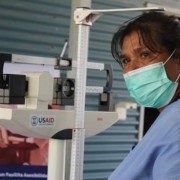Speeches Shim

The United States Agency for International Development in Timor-Leste is working hand in hand with the Government of Timor-Leste to help the country mitigate the effects of the global COVID-19 pandemic in Timor-Leste. The American people have generously donated $1.6 million in funds to the effort. USAID is adapting existing programming where possible to help meet the challenge.
To: All Interested Respondents/Parties: The USAID/Timor-Leste Local Works Program is designed to advance locally led development and enhance the Agency’s ability to empower local actors to take the lead in addressing the development challenges (https://www.usaid.gov/localworks). It will identify the priorities of Timorese youth and support youth in leading productive lives where their voices are heard. The Local Works program is currently designing a broad listening tour, which will include focus group and individual discussions with youth and other local stakeholders across the 13 districts of Timor-Leste. This Request for Information (RFI) seeks to identify local entities and individuals with capabilities needed to support the listening tour.

Timor-Leste youth face an uncertain future in the post-conflict country where more than half the population is under 30 and the unemployment rate for young people is nearly 10.5 percent, but four young Timorese artists are seeing a brighter horizon with help from USAID’s Tourism For All Project.

Timor-Leste’s profile on the world tourism stage got a little larger with the help of USAID’s Tourism For All Project, which recently worked with the Ministry of Tourism and the private sector to bring a group of three travel agents from Singapore for a visit to familiarize themselves with Timor. The five-day trip gave the agents a first-hand view of some of Timor-Leste’s charms as an international tourism destination, from the shores of scuba paradise Ataruo Island to Dili to the mountains of Maubisse.

Teaching and practicing conservation agriculture techniques is a large part of USAID’s Increasing Community Resilience in Oeccuse activity (ICRO), which focuses on helping communities preserve and protect community water sources. In turn, that increases community self-reliance. It’s an important part of the activity because of the scarcity of water and uncertainty of rains, even during the December-April rainy season.

Comment
Make a general inquiry or suggest an improvement.